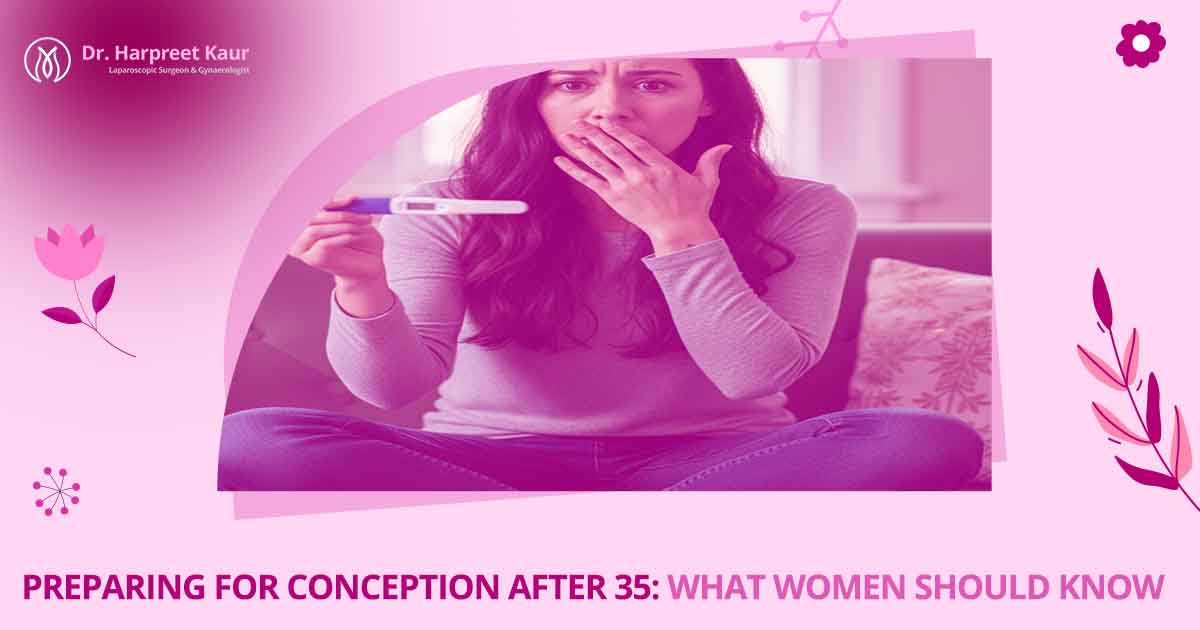Clinic Location
Care n Cure Clinic, Nayapalli, Near Hotel Crown, Bhubaneswar
For Consultation
+91 7008110200
+91 9090910009
Work Hours
Mon - Fri : 05:30 - 07:30
- Home
- About Doctor
- Services
Postnatal care
Gynaecological services
- General Consultatnt
- Adolescent Clinic
- Well Women Clicnic
- Gynaecological Surgeries
- Gallery
- Your Pregnancy
- Training
- Contact
- Feedback
- Blog
- Home
- About Doctor
- Services
Postnatal care
Gynaecological services
- General Consultatnt
- Adolescent Clinic
- Well Women Clicnic
- Gynaecological Surgeries
- Gallery
- Your Pregnancy
- Training
- Contact
- Feedback
- Blog
- Home
- About Doctor
- Services
Postnatal care
Gynaecological services
- General Consultatnt
- Adolescent Clinic
- Well Women Clicnic
- Gynaecological Surgeries
- Gallery
- Your Pregnancy
- Training
- Contact
- Feedback
- Blog
Preparing for Conception After 35: What Women Should Know

Modern lifestyles and evolving priorities mean that more women today are choosing to delay pregnancy. While this decision brings maturity, stability, and preparedness, it also raises important considerations for reproductive health. For women in their mid-30s and beyond, fertility over 35 becomes a central discussion point. If you are trying to conceive after 35, understanding how age affects fertility, what steps can improve your chances, and when to seek medical advice can make your journey smoother and more informed.
The Biological Reality of Fertility Over 35
Fertility naturally declines with age due to a decrease in both the quantity and quality of eggs. Women are born with a finite number of eggs, and by age 35, both the reserve and the genetic health of eggs begin to decline more noticeably. While pregnancy is absolutely possible, it may take longer and can sometimes require medical support.
Key factors include:
- Egg Quality: Chromosomal abnormalities become more common after 35, which may impact conception and pregnancy outcomes.
- Ovulation Patterns: Cycles may become shorter or irregular, reducing the chances of timely conception.
- Increased Health Risks: Risks such as gestational diabetes, hypertension, and miscarriage are slightly higher.
Why Trying to Conceive After 35 Requires Planning
Trying to conceive after 35 may involve a bit more intention and preparation compared to younger years. Planning is essential because:
- It helps optimize natural fertility before turning to medical intervention.
- It ensures pre-existing health conditions are addressed before pregnancy.
- It allows women to understand realistic timelines and expectations
Steps to Boost Fertility Over 35
1. Schedule a Preconception Check-Up
Consult a gynecologist for a thorough evaluation. Tests may include hormone levels, thyroid function, and an ultrasound to assess ovarian reserve. These insights provide a roadmap for the next steps.
2. Adopt a Nutrient-Rich Diet
Nutrition plays a vital role in reproductive health. Focus on:
- Folate and Vitamin B12: Essential for egg quality and early pregnancy health.
- Antioxidants (Vitamin C, E, and zinc): Combat oxidative stress that affects egg health.
- Iron and Calcium: Strengthen overall health before conception.
3. Maintain a Healthy Weight
Both underweight and overweight women may experience hormonal imbalances that affect ovulation. A balanced weight supports better chances of natural conception.
4. Exercise Moderately
Gentle to moderate activity like walking, yoga, or swimming helps maintain energy and regulate hormones. However, excessive exercise can suppress ovulation.
5. Track Ovulation Accurately
For women managing fertility over 35, timing is everything. Using ovulation predictor kits, basal body temperature tracking, and monitoring cervical mucus can pinpoint the fertile window more effectively.
6. Quit Smoking and Limit Alcohol
Both habits negatively impact egg quality and overall reproductive health. Limiting caffeine is also advisable when trying to conceive.
Emotional Health Matters
Trying to conceive after 35 can sometimes be emotionally taxing due to societal expectations, biological limitations, or previous struggles. Stress management through mindfulness, therapy, or support groups can ease the emotional burden and even support better hormonal balance.
Assisted Reproductive Options for Fertility Over 35
If conception does not occur after several months of trying, assisted methods may be considered:
- Ovulation induction with medication to stimulate egg release.
- Intrauterine Insemination (IUI), which increases the chances of sperm meeting egg.
- In Vitro Fertilization (IVF), offering advanced solutions, especially when egg quality is a concern.
- Egg Freezing may also be an option for women who want to delay pregnancy further.
When to Seek Medical Help
Women over 35 should consult a fertility specialist after six months of unsuccessful attempts at conception, compared to one year for younger women. Early medical support can save valuable time and expand options.
Conclusion
Pregnancy after 35 is not only possible but increasingly common. However, being informed about the realities of fertility over 35 and the strategies that improve the chances of conception is essential. By maintaining a healthy lifestyle, seeking early medical advice, and exploring supportive treatments when necessary, women can confidently embrace their fertility journey. If you’re trying to conceive after 35, remember that preparation, patience, and proactive healthcare are the keys to success.

